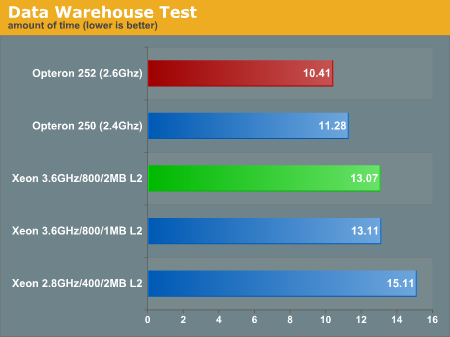Intel Xeon 3.6 2MB vs AMD Opteron 252 Database Test
by Jason Clark & Ross Whitehead on February 14, 2005 8:00 AM EST- Posted in
- IT Computing
Data Warehouse results
As can be seen from the results, the doubling of the L2 Cache did not improve performance on the Xeon's in this test. We speculate that this is because the test consists of approximately 10 long running queries, which are processing datasets that are 100's of megabytes, thus not allowing for reuse of the L2 Cache. The Opteron, on the other hand, excelled due to its on-die memory controller. The different platforms exhibited approximately 50% CPU utilization across all CPUs. This demonstrates that you do not have to be CPU bound to experience the benefits of faster CPUs.











97 Comments
View All Comments
semo - Tuesday, February 15, 2005 - link
is it possible to have a dual proc setup without using registered memory?Proton - Tuesday, February 15, 2005 - link
"We did a revamp of the tool itself, which is more performant on high volume queries."Performant?
Please read this article...
http://msdn.microsoft.com/msdnmag/issues/05/03/Edi...
"More recently, we've seen the word "performant" start its crawl into the everyday vocabulary of devspace. It is used to mean "highly performing." It's also not a word. When something provides information, it's informative. It's not "informant." The word "performant," if it existed, would be a noun—not an adjective. But it doesn't exist, so if you do see it in print, remember that it's not really there.'
ceefka - Tuesday, February 15, 2005 - link
#15 Jason, let me rephrase that#10: "However compact"... That would do it more justice ;-)I didn't thank you for the effort you and Ross put into this, did I? Your article came out together with the announcements of AMD. Hot stuff! How much time/sleep did you really have?
Viditor - Tuesday, February 15, 2005 - link
"What memory timings?"Good question...
"is it dual vs Dual or single vs single"
single vs single, 32bit
prd00 - Tuesday, February 15, 2005 - link
Wait... I think I miss something here.. is it dual vs Dual or single vs single?Zebo - Tuesday, February 15, 2005 - link
What memory timings?Viditor - Tuesday, February 15, 2005 - link
"I don't know if it fixes the IOMMU issue or not"As far as we know, it doesn't. The Smithfield is a desktop part, so that is to be expected...large quantities of memory aren't yet necessary for the desktop.
"Now this is interesting. Somewhere were Intel comes out on top by a big margin"
(grin) Only the most diehard AMD fan would deny Xeon's capabilities...
For a 1 or 2 CPU server that is used for low-end database serving or webserving, the new Xeon is excellent in 32bit (the CPU of choice)!
As the next few months grind ahead, we will see quite a few scenarios on review sites. My own suppositions are that
1. In a 1 or 2 single core Opteron system there is almost no bandwidth constraint. This is evidenced by the lack of change with the 25% HT increase to 1GHz. That said, we might see significant changes in 4 and 8 way systems, especially as dual cores come on-line.
2. We still have no reviews of these two platforms in 64bit using >4GB of ram. I suspect that Opteron will be much more effective there...
3. When Intel releases their mp Xeon Nocona, I suspect that 4 and 8 way Opteron systems will blow their doors off...my rationale is that the 1GHz HT links and AMD's MOESI cache protocol gives them a huge advantage in scaling processors.
Staples - Tuesday, February 15, 2005 - link
Now this is interesting. Somewhere were Intel comes out on top by a big margin.fitten - Monday, February 14, 2005 - link
BTW... there is a new chipset (or some new chipsets) being released soon along with the Smithdale CPU. I don't know if it fixes the IOMMU issue or not, but it might be worth a look...Viditor - Monday, February 14, 2005 - link
"no mention in any of the access scenarios is described as 32bit..."Oops...yes it does.
"Some devices, such as a large majority of PCI cards cannot directly access memory above the 4GB point"